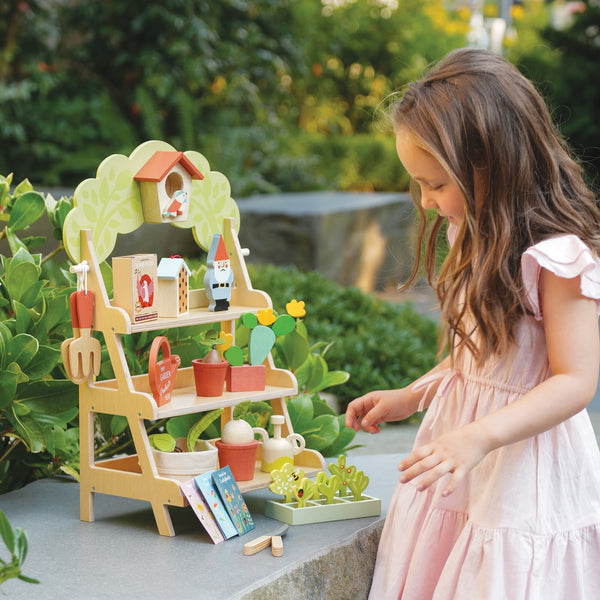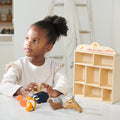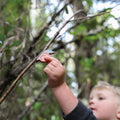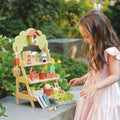The Brain-Boosting Magic of Summer Play

Do you remember going back to school after summer feeling different?
You walked taller. You looked teachers in the eye. The ‘big kids’ didn’t seem so big anymore.
What happened?
Endless days
Summer has a rhythm of its own. The days feel longer, routines loosen, and there’s more time to play. For young children, this isn’t just a welcome break – it’s a chance to grow in ways busy term-time schedules don’t allow.
Long, lazy afternoons in the garden, family outings, or simple moments with friends add up to something powerful: time to choose, explore, and play without being told what to do. This freedom doesn’t just keep your child busy – it builds independence and self-control.
Researchers call these skills executive functions – the brain’s control system for focus, memory, flexible thinking, and planning ahead. They develop fastest in the early years, and summer is the perfect time for your child to strengthen them through everyday play.
A test of character
Building sandcastles at the beach is a real test - of skill, patience, and character.
Can your child remember the steps you showed them? Did they pick a good spot, and sand that was neither too wet nor too dry? Did they tap the bucket in just the right way to make sure it came off smoothly?
It’s also wise not to rush. Building on an unstable base leads to disaster, but that’s not the only challenge with impulsivity: you absolutely must not, ever, kick your sibling’s sandcastle over. No matter the provocation, it only makes things worse.
And then, after such heroic work, the tide comes in and washes it all away. Heartbreaking – and the perfect test of executive functions.
What are executive functions – and why does summer matter?
Executive functions are your child’s internal toolkit for getting things done:
• Working memory. Holding steps in mind, like remembering how to build the castle.
-
Inhibitory control. Pausing before acting or taking turns.
-
Cognitive flexibility. Adapting when the tower collapses and trying again.
These skills grow through playful, hands-on experiences. When your child chooses what to play, solves problems, or negotiates with siblings, they build the focus and flexibility they’ll need in school.
Summer offers the ideal setting for this growth. With fewer schedules, children get the freedom to invent games, practise self-control, and stay absorbed in their own ideas – all while playing.
Research insights
Science confirms what we see in summer play: the skills your child practises on the beach or in the garden matter more for school success than IQ.
In a landmark study, researcher Adele Diamond found that early executive function skills – focus, memory, and self-control – predict how well children do in school more accurately than intelligence tests. And the best part? These skills grow fastest in playful, low-stress settings – exactly what summer provides.
Apply it;
-
Self-regulation. Games with rules, turn-taking, or delayed gratification (like building with wooden blocks) help children practise inhibitory control.
-
Flexible thinking. Activities where there’s no single ‘right answer’ – like pretend play – encourage children to adapt and approach problems from new angles.
-
Working memory. Building a railway track or running a pretend shop requires your child to hold several thoughts in mind at once.
-
Collaboration. Negotiating roles in role-play, resolving conflicts, or inventing shared rules all demand communication and perspective-taking.

How unstructured summer days build EF naturally
Summer is your child’s best training ground for focus and independence. Without the rush of school, they finally have time to follow their own ideas and stay absorbed in play.
When children are left to their own devices – building dens, inventing games with friends, or turning sticks into magic wands – they’re practising executive function without even realising it.
Here’s how those slow days do the heavy lifting:
-
Long focus. With no clock dictating the next activity, your child can stay absorbed in one game for far longer, strengthening their attention.
-
Real decisions. Choosing what to do next or how to solve a problem builds flexible thinking and planning.
-
Social problem-solving. More time with siblings or friends means more chances to negotiate rules, take turns, and resolve conflicts.
Your role? Step back. Keep the day light on structure, offer simple play invitations, and resist the urge to interrupt this deep, magical play.
Toys that spark storytelling and problem-solving
Some toys are just built for summer. When you choose toys that don’t have a single fixed purpose, you open the door to richer play and stronger executive function skills.
Here are some ideas:
-
Doll’s houses and figures. Acting out daily routines or inventing adventures builds working memory, sequencing, and flexible thinking. Try the Foxtail Villa doll’s house.
-
Merrywood Tales Take a peep at our beautiful Merrywood Tales for some countryside adventures.
-
Wooden railways. Building a track that loops back requires planning ahead, testing ideas, and problem-solving. The Mountain View train set is a wonderful choice.
-
Pretend play props. Tea sets, play food, or animal figures invite children to create their own narratives, negotiate roles, and adapt the story as they go.
-
Soft toys. A rag doll or cuddly animal can become a companion in imaginative worlds.
-
Outdoor toys. Buckets, spades, or a simple ball encourage collaboration and spur spontaneous, open-ended play.
These toys don’t just keep your child entertained – they create space to practise attention, planning, and persistence in a way that feels entirely natural.
5 summer shifts that build executive function
 1. Mix age groups. Cousins, neighbours, and family friends bring new games and roles. Your child learns to adapt, negotiate, and lead.
1. Mix age groups. Cousins, neighbours, and family friends bring new games and roles. Your child learns to adapt, negotiate, and lead.
2. Stretch the day. Hide-and-seek at dusk. A nature walk at dawn. Longer days invite new adventures.
3. Encourage big projects. Dens built over days. A cardboard city painted piece by piece. These teach persistence and planning.
4. Use what’s around you. Shells, flowers, and sticks become treasure, food, or fairy furniture. Seasonal materials spark creativity and keep play tied to nature.
5. Make space for boredom. Empty time invites invention. When there’s ‘nothing to do’, children create their own fun – the perfect EF workout.
Try this: at bedtime, instead of a story, open the back door and step into the night. Take a torch. What will you discover? Which creatures are awake – and what shadows can you make?
Final word
It’s September. The summer is over. And your child has changed.
They walk taller. They linger less at the door. They hold your gaze and answer their teacher with a new confidence.
What happened?
Those long, lazy days did their work. The hours spent building castles, inventing games, and solving small squabbles rewired their brain in ways no worksheet could. Summer didn’t just give your child a break – it gave them practice.
Executive function isn’t taught in a lesson. It’s built in the pauses: waiting to take your turn in a game, persisting with a tricky build, finding a new way to play when the old one falls flat.
When you think back on this summer, you’ll see it everywhere: that hour lost in pretend play, the delicate negotiation over who got to be ‘shopkeeper’, even the stick that became a magic wand.
These weren’t small things. They were the foundations of focus, flexibility, and self-control.
So when September comes and your child seems somehow older, know it wasn’t magic. It was summer – unhurried, playful, and exactly what their growing brain needed.







